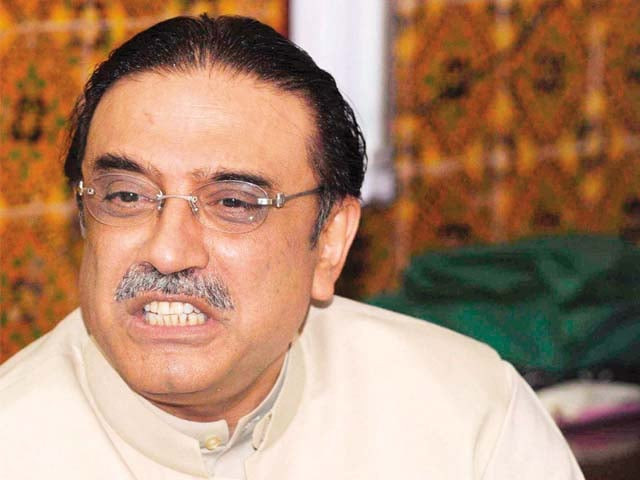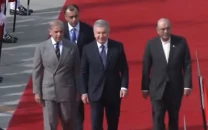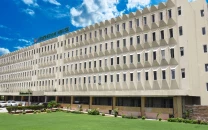Pakistan: WikiWreaks havoc
Leaked documents provide insight into behind-the-scenes developments in Pakistan.

Kayani felt that Talpur would make a better president than Zardari
According to a February 2009 memo, President Zardari told Bilawal Bhutto-Zardari that if Zardari was assassinated, Bilawal should name the president’s sister, Faryal Talpur, as president. Chief of Army Staff (COAS) General Ashfaq Parvez Kayani told US ambassador to Pakistan Anne Patterson that Talpur would be a better president than her brother. The memo notes that “embassy officers have been very impressed with Talpur.”
UAE’s Foreign Minister Abdullah bin Zayed told US Special Representative Richard Holbrooke in January 2010 that Zardari had asked Zayed to convey a request to the UAE Presiden that Zardari’s family be allowed to live in the UAE in the event of his death.
In a February 2008 meeting with Patterson, Zardari said “he was ‘struggling’ over who would be named Senate chairman. When he said the best candidate would be Farooq Naek, Zardari was asked who would be law minister. “That’s the problem. We don’t have enough good people.” According to Zardari, Sherry Rehman “was dying for the job,” but Jamiat Ulema-e-Islam would never vote for a woman. He also wanted to replace NWFP Governor Owais Ghani soon but had not done so because it would create political issues. His choice was Frontier Corps Inspector Maj General Tariq Khan but Patterson “tried to discourage that idea” because “Khan was desperately needed in the ongoing fight.”
Zardari was also considering names for National Security Adviser. Maleeha Lodhi was dismissed because “the party doesn’t trust her” and retired COAS Jehangir Karamat was “probably too old and, as a former COAS, Kayani would always have to defer to him.”
Army chief wanted Zardari out, Asfandyar as president
Kayani spoke of an ‘unofficial’ coup that would not require elections
During the judicial crisis, Kayani hinted to Patterson that he may ‘reluctantly’ have to urge Zardari to resign if conditions deteriorate and ‘indicated that Asfandyar Wali Khan or someone else broadly acceptable might be an appropriate replacement.’ The US believed this was a sign that they were being forewarned of political developments.
The March 12, 2009 memo states, “Kayani made it clear that regardless of how much he disliked Zardari, he distrusted Nawaz even more. The scenario Kayani hinted at was one in which he would pressure Zardari to resign (and presumably leave the country). This would not be an official army ‘coup’; it would leave the PPP govt led by Gilani in place and preclude the need for elections that likely would bring Nawaz to power.”
Ironically, Zardari is also quoted in another memo as saying Kayani would never accept Nawaz Sharif as prime minister. According to the memo, Kayani also hinted at disquiet among corps commanders who believe Zardari is corrupt and had not paid enough attention to economic and security challenges. ISI DG Ahmed Shuja Pasha had also spoken to Patterson over his concerns about Zardari.
Kayani said he talked directly to Zardari, but “does not appear to have conveyed the seriousness of army concerns about Zardari or the security situation vis-a-vis the long march.” Patterson speculated, “Kayani may be seeking to avoid a confrontation that would prompt Zardari to make a disastrous decision to try and oust the COAS.”
We’ll protest in the National Assembly and then ignore it: PM
Gilani says he doesn’t care about drone strikes as long as they get the right people
In 2008, Interior Minister Rehman Malik suggested the US hold off ‘alleged Predator attacks’ until after the Bajaur operation. According to a memo, Prime Minister Yousaf Raza Gilani brushed aside Malik’s remarks and said, “I don’t care if they do it as long as they get the right people. We’ll protest in the National Assembly and then ignore it.”
In a February 2009 memo, Anne Patterson wrote: “Drone strikes have put increasing political pressure on the Pakistani government, which has struggled to explain why it is allowing an ally to violate its sovereignty.
“The government of Pakistan has so far has denied recent media reports alleging that the US is launching the strikes from bases in Pakistan. Kayani knows full well that the strikes have been precise (creating few civilian casualties) and targeted primarily at foreign fighters in the Waziristans.”
UK officials also told the US in 2008 that while the Pakistani leadership was not troubled by Predator strikes that kill “Arabs” and Taliban, those attitudes could change.
US suspicious of Pakistan Army bills
Military asked for radar maintenance though there was no ‘enemy air threat’
According to a Dec 2007 memo, “Pakistan received $55 million for helicopter operations from July 2006 to Feb 2007; however … as few as three Cobra helicopters were fully mission capable as recently as 10 weeks ago. The US is confident Army Aviation Command never got the money.”
The army also claimed $99 million for medical operations for 12 months but the FC IG kept asking for help for this and was ‘obviously unaware’ of the resources already given by the US.
Pakistan submitted claims for almost $70 million in ADA Radar Maintenance between August 2006 and July 2007, “Although there is no enemy air threat related to the war on terror.” Another ‘highly suspect’ claim was for $26 million for barbed wire and pickets.
Kayani told Petraeus in 2009 it was important to avoid the impression that the military is “for hire.” However, the army had little incentive to provide the documentation required for funds, “since only 40 per cent of the money had been returned to military coffers in the past.”
Army asks US Special Ops for help in FATA and Waziristan
US support helped FC execute operation
A long-standing controversial point has been confirmed in the latest release of documents by WikiLeaks. The Pakistan Army did ask for US special operations elements to support military operations. In September 2009, four personnel were embedded with the Frontier Corps (FC) at a location in Fata and provided intelligence, surveillance, and reconnaissance (ISR) for a FC operation. The support, according to the memo, “enabled the FC to execute a precise and effective artillery strike on an enemy location.”
Another request came in October from the army’s 11 Corps Commander, Lt General Masood Aslam, for Special Ops personnel to deploy to two locations in North and South Waziristan respectively to provide ISR support and general operational advice.
US believes military expanding weapons programmes
Patterson concerned someone could smuggle material out to make a weapon
In a briefing memo to US National Security Adviser Jim Jones in September 2009, the then-US ambassador to Pakistan Anne Patterson wrote that US-Pak nuclear cooperation on security issues has decreased after statements made in the press about purported US plans to seize nuclear facilities surfaced.”
While she noted that US experts have provided training to Pakistan in a wide variety of topics ranging from technology controls to physical protection, provided critical equipment, and encouraged Pakistan’s adherence to international non-proliferation instruments, the government did not appreciate suggestions that its nuclear weapons could fall into terrorist hands and had reacted to reports of US plans to seize the weapons in case of emergency.
According to Patterson, “Pakistan has begun to pull back from some non-proliferation engagement with the US government, including refusing high-level discussions and delaying implementation of some programs. One effort to remove jointly spent nuclear fuel from a Pakistani nuclear research reactor, for instance, has been put on hold for three to four months, or until media attention has abated.”
In another memo, Patterson wrote, “Our major concern is not having an Islamic militant steal an entire weapon but rather the chance someone working in Government of Pakistan facilities could gradually smuggle enough material out to eventually make a weapon.”
Patterson also stated in a document that “Kayani does not support Zardari’s statement to the Indian press that Pakistan would adopt a ‘no first use’ policy on nuclear weapons. Despite increasing financial constraints, we believe that the military is proceeding with an expansion of both its growing strategic weapons and missile programmes.”
Pakistani government ‘gives up on Swat’
Kayani says police has no ability to ‘hold’
According to a 2008 assessment of the Federally Administered Tribal Areas (Fata), the US was told that the move to pull troops from Swat was about a decision by the Pakistan government to “give up on Swat for now”. The individual – whose name has been retracted – said, “We have given the Taliban the north of Swat, so why not give them the city of Mingora too.”
In 2009, Kayani admitted to General David Petraeus that the government had lost control of Swat. According to a memo of their meeting, Kayani said “the police had no ability to come in after the army to ‘hold’ territory. He recounted that half of the 600 police officers, supposedly from the NWFP’s elite police units, destined for Swat had deserted, largely because there was no command structure.”
Saudi Arabia ‘waiting for the Zardari government to fall’
UAE says Saudis never liked the PPP and support Nawaz Sharif
Saudi Arabia’s dislike of Zardari has been made evident from leaked memos, including one which quotes King Abdullah saying about Zardari, “When the head is rotten, it affects the whole body.”
Memos show Saudi Arabia supports Nawaz Sharif but Zardari continues to be disliked. In 2008, UAE Foreign Minister Abdullah bin Zayed said, “Saudi Arabia suspects that Zardari is Shia, thus creating Saudi concern of a Shia triangle in the region between Iran, the Maliki government in Iraq, and Pakistan under Zardari.”
Zayed also said “the Saudis have never liked the PPP and support Nawaz Sharif.”
Pakistan’s ambassador to Saudi Arabia Umer Khan Alisherazi confirmed this to the US ambassador in the country. “We have been punished by Saudi Arabia because our president talks to the Iranians.”
In a May 2009 meeting with Holbrooke, Saudi Assistant Minister of the Interior Prince Mohammed bin Nayef said the Pakistan Army was the Saudis’ “winning horse” and was Pakistan’s “best bet” for stability. According to Nayef, “Pakistani soldiers needed to be proud of their service and not hide their identity as soldiers when they were off duty. He had told Kayani that Pakistani troops needed to feel they were fighting for Pakistan and not the US.”
In October 2008, Pakistani Deputy Chief of Mission Sarfraz Khanzada characterised Saudi-Pak relations as being “under strain” because of the lack of Saudi confidence in the Zardari government. Khanzada said that there had been a sharp reduction in financial assistance to Pakistan, and that the Saudis had not provided “a single drop” of oil at the concessionary terms promised last year. “Instead, during 2008, the Saudis had provided assistance in the form of a single $300 million check, considerably less than in previous years, but ‘beggars can’t be choosers,’ he lamented. Khanzada opined that the Saudi government appeared to be ‘waiting for the Zardari government to fall.’”
Zardari suspects Shahbaz Sharif tipped off JuD
US delayed designating JuD as LeT’s alter-ego for fears over security of US forces
The PML-N led government in Punjab gave a grant of Rs82 million to Jamaatud Dawa (JuD) in 2009-2010, but Zardari suspects the ties between the organisation and PML-N are much deeper. He told Patterson in January 2009 that Shahbaz Sharif had tipped off the JuD about the UN Security Council Resolution 1267 mandated asset freeze, with the result that JuD had almost empty bank accounts, (the bank account data was also confirmed separately to the US by the ministry of interior.)
Older memos also provide an insight on JuD. The US ambassador asked for a two-week delay in March 2006 for the process of moving ahead “with UN 1267 and domestic terrorism finance designation of JuD as an alter-ego of current terrorism finance designee Lashkar-e-Taiba”.
The reason for the delay was because US military personnel would be flying helicopter missions in NWFP and Azad Jammu and Kashmir until the end of March. Additionally ground support personnel would be deployed in Muzaffarabad at the same time. The ambassador wrote that no action would be taken on the JuD designation until the mission had concluded, “in order not to increase the risk to our military personnel.”
US knew about extrajudicial killings but stayed quiet
Officials told to avoid commenting on human rights abuses
According to a September 2009 memo, the US was aware that extrajudicial killings and human rights abuses were taking place during military operations in the Malakand division and Fata. According to the memo, “Senior military commanders have equally and repeatedly stressed their concerns that the courts are incapable of dealing with many of those detained on the battlefield and their fears that if detainees are handed over to the courts and formally charged, they will be released, placing Pakistan Army and FC troops at risk.”
The memo notes there may be 5,000 terrorist detainees in the custody of the army and FC from military operations.
However, the US believed this was a matter of a ‘culture of revenge that underlies many of the extra-judicial killings taking place in the Malakand division and Fata.’
The US believed that a viable alternative to deal with detained combatants and the establishment of a credible detention facility would decrease human rights abuses. However the memo recognised, “much of this is dependent on goodwill within the Pakistan military and civilian establishment that can easily erode if too much public criticism from US government officials over these incidents is forthcoming.” The memo advised “that we avoid comment on these incidents to the extent possible.”
US concerned about information requests on refugee and IDP camps
Patterson said the reasons for the request remained unclear
A 2008 memo states that there may have been an attempt to gather information for a strike on camps housing Afghan refugees or Internally Displaced Persons (IDPs) in Pakistan.
According to a memo, US embassies in Kabul and Islamabad had received requests from the Defence Attache Office and United States Special Operations Command (and its contractor) requesting information on camps along the Pak-Afghan border housing Afghan refugees and/or IDPs.
Patterson was concerned these would be used to target the camps. She wrote, “The purpose of the request for information remains unclear; some e-mails have suggested that agencies intend to use the data for targeting purposes; others indicate it would be used for ‘No Strike’ purposes.”
Patterson said, “We are concerned about providing information gained from humanitarian organisations to military personnel, especially for reasons that remain unclear.”
US says ‘establishment’ hampered work
Patterson wrote in a memo that the military and intelligence establishment was concerned that the US was working with Pakistan’s civilian leadership ‘to limit the military’s prerogative in determining Pakistan’s national security policies.’
The memo alleged that the establishment hampered the embassy’s operations, including “sabotaging a contract with DynCorp International to provide enhanced protective support for Consulate General Peshawar personnel”, holding up visas, denying import permits for armoured vehicles, slowing down importation of US assistance for the Pakistani government, putting up roadblocks in acquiring additional land for the embassy’s expansion and harassing embassy personnel by stopping and detaining embassy vehicles.
Aafia Siddiqui was never at Bagram
US denies knowledge of whereabouts of Siddiqui’s children
A July 31, 2008 memo about a US embassy legal attache being named in a petition about Aafia Siddiqui says, “Bagram officials have assured us that they have not been holding Siddiqui for the last four years, as has been alleged.”
Gilani told US Senator John Kerry in February 2010 that Siddiqui should be repatriated, with the result that “the US would be in the Pakistani people’s good graces.”
In 2008, Acting Foreign Secretary Khalid Babar raised the issue of Siddiqui’s children with Anne Patterson. Patterson said the children have never been in US custody and authorities do not know of their whereabouts.
Pakistani officials told the US that if Siddiqui were repatriated she would remain under house arrest in Pakistan. The US believes Siddiqui’s issue would persist for some time.
Zardari wanted CJ to be Governor of Balochistan
President planned to tie up judges’ issue for months
In August 2008, Zardari told Patterson he was trying to keep Nawaz Sharif in the coalition and candidly remarked that he planned to tie up the judges’ issue for a long time.
Zardari’s plan was that the parliament would debate the restoration of the judges and Chief Justice Dogar would submit some rulings on the restoration of the judges, a process which would take months.
He said he was also trying to persuade then-former Chief Justice Iftikhar Chaudhry to become Governor of Balochistan. Patterson noted that the Balochistan governor resigned on August 20, which was a move ‘clearly orchestrated’ by Zardari so he could offer Chaudhry the position.
Kayani upset Zardari and Gilani delayed Musharraf’s indemnity
COAS said delay made him look bad within the army
Leaked memos show that both President Asif Ali Zardari and Prime Minister Yousaf Raza Gilani had agreed to providing immunity for Pervez Musharraf but wanted to delay it until after Zardari was elected as president, since they believed this would affect the vote.
However, General Kayani was against the delay and told the US ambassador to Pakistan that he took Zardari’s commitments to Musharraf as the most important argument in persuading him to resign.
According to the COAS, the delay made him look bad within the army and he is quoted as saying, “I have to bring the Army along with me.”
ISI cautions against providing Brahamdagh Bugti asylum
Afghan President Karzai admitted Bugti is in Kabul and agreed to press him on the issue of John Solecki’s kidnapping
The US asked the United Nations High Commissioner for Refugees (UNHCR) not to proceed with an asylum for Baloch nationalist Brahamdagh Bugti.
In December 2009, UNHCR Assistant Representative Kilian Kleinschmidt met with an individual who sought UNHCR support in facilitating Bugti’s movement out of Afghanistan. According to the memo, the individual – whose name has been retracted from the memo – told Kleinschmidt that Ireland was willing to receive Bugti, who “had to get out of Afghanistan and would not be safe returning to Pakistan.”
However, the UNHCR believed that while the asylum would be in Pakistan’s interests, its involvement “could have a negative impact on UNHCR’s humanitarian access, operations, and security in Pakistan.”
It wanted an assurance that Pakistan would “not act against such a transfer or penalise UNHCR’s potential involvement in it.”
Kleinschmidt also told the US that his meeting with the aforementioned individual and all UNHCR interaction with Baloch leaders had been monitored by Pakistani intelligence.
Patterson reportedly said the US would be supportive of Bugti being moved but Ireland would need to confirm this to UNCHR and “expressed concern about the possible implications of the individual’s stipulation that Bugti would need to be able to freely travel outside his country of asylum.
However, the move was not met with well by the ISI, which led to the US advising the UNHCR not to go ahead with the initiative. ISI Director General Ahmed Shuja Pasha reportedly said that he believed Bugti should return to Pakistan to stand trial for his crimes, and while the decision belonged to the ministry of affairs, “the Pakistan military would not favour allowing Bugti to be accorded refugee status.” The memo also noted that efforts on part of UN agencies in this regard would “colour the military’s perception of those agencies and affect their working relationships.”
In February 2009, Afghanistan president Hamid Karzai had admitted to UN Special Representative to Afghanistan Kai Eide that Brahamdagh Bugti was in Kabul and agreed to press Bugti on kidnapped Balochistan UNHCR chief John Solecki’s release.
During the course of discussion on efforts to secure Solecki’s release, Rehman Malik told the US that Bugti was primarily responsible for the kidnapping. The memo noted that he suggested that the “Bugtis and the Marris, although rivals, were in fact colluding in this case and that their accusations against each other were only stalling tactics. He proposed efforts to split them by telling each side the other was privately accusing it of kidnapping Solecki. He also urged that the US (through intermediaries) begin to threaten Bugti with extradition to Pakistan in the event something happened to Solecki.”
Malik was told that, “in that case Bugti would be extradited to the US to be tried for allegedly murdering a US citizen.”
Published in The Express Tribune, December 2nd, 2010.



















COMMENTS
Comments are moderated and generally will be posted if they are on-topic and not abusive.
For more information, please see our Comments FAQ